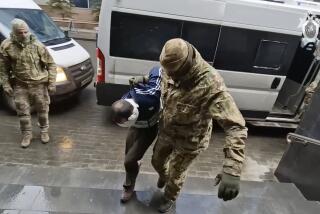A Crippled Central Asia
- Share via
The nations of Central Asia that now find themselves on the front lines in the war against terrorism have experienced a traumatic decade of independence that dashed many hopes for greater economic, political and religious freedom. The assistance of these countries in the U.S.-led coalition against Osama bin Laden and his Al Qaeda organization is welcome, but the dictators and autocrats in power must not treat their new status on the world stage as endorsement of corruption and repression.
Tajikistan and Uzbekistan are both on Afghanistan’s northern border and have populations that are largely Muslim. Tajikistan, still struggling to recover from a civil war that occurred in the early 1990s, also is home to about 25,000 Russian troops, 10,000 of them along the Afghanistan border.
The Tajiks and Russians have extensive links with the Northern Alliance soldiers who are battling the Taliban, the political ruler of Afghanistan and host to Bin Laden. The United States has identified Bin Laden as the prime suspect in the terrorist attacks on the World Trade Center and the Pentagon and has vowed to dismantle his network.
Uzbekistan has done the most to distance itself from Russia since the Central Asian republics of the Soviet Union became independent in 1990 and 1991. A carry-over from Soviet days has been central economic planning, a disaster that has demoralized the citizenry. Nearly as bad has been the crackdown on legitimate voices of dissent, including the banning of Muslim opposition parties. The sorry shape of Uzbekistan has fueled fundamentalist Islamic movements, one of which is now based in Afghanistan and has conducted guerrilla raids into Uzbekistan.
If the United States uses either or both countries as military staging areas, it should cough up economic assistance. The longer and larger a U.S. presence in the countries, the bigger an aid package is called for.
That’s not to say Washington should write a blank check. Getting economic reforms in place would help improve the standard of living, which can go far to reduce opposition to the governments. People with a stake in the future are less likely to resort to violence. Political reform also is needed. Allowing opposition groups to become legal political parties can channel dissent into productive channels, rather than letting it prompt opponents to take up arms.
Economic ties should last as long as the fight against terrorism, meaning a very long time. Assistance should not be a quick, one-time offering. Undoing the mistakes made in Tajikistan and Uzbekistan will not be quick or easy for their regimes. But there still is time for the nations of Central Asia to enact reforms that can stop the region from becoming a maelstrom of violence. Political and economic liberalization, and letting people practice their religions openly, will benefit the countries and the region.
More to Read
Sign up for Essential California
The most important California stories and recommendations in your inbox every morning.
You may occasionally receive promotional content from the Los Angeles Times.













